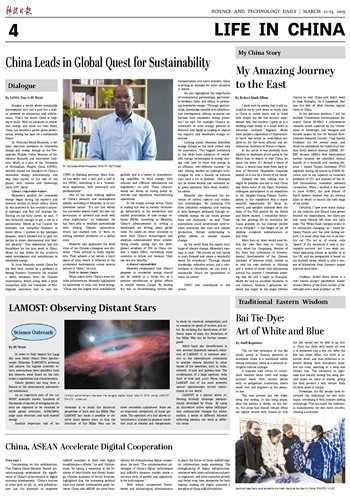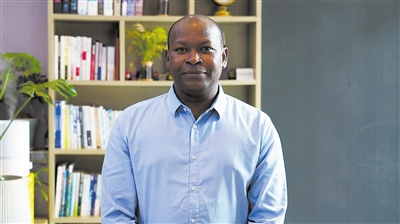
 |
| Dr. Nicholas Mulei Musyoka. (PHOTO: S&T Daily) |
Imagine a world where sustainable development isn't just a goal but a reality, powered by innovation and collaboration. That's the world China is helping to build. With its advances in renewable energy and other sci-tech fields, China has become a global green powerhouse, setting the pace for a sustainable future.
Dr. Nicholas Mulei Musyoka, a Kenyan associate professor in renewable energy and energy storage at the Nottingham Ningbo China Beacons of Excellence Research and Innovation Institute, which is a part of the University of Nottingham Ningbo China (UNNC), recently shared his thoughts on China's renewable energy achievements and why they matter to the rest of the planet, with Science and Technology Daily (S&T Daily).
China's cooperative nature
Musyoka's passion for renewable energy began during his master's and doctoral studies in South Africa, where he was involved in the country's national hydrogen and fuel cell strategy. Reflecting on his early career, he said, "I was fortunate enough to get a job as a postdoctoral fellow at the Council for Scientific and Industrial Research in South Africa. I worked in the hydrogen program, which allowed me to gain expertise in major international and bilateral projects." This experience laid the foundation for his later work in China, where he was drawn by the country's rapid development and commitment to renewable energy.
In 2019, Musyoka visited China for the first time, invited by a professor at Beijing Forestry University. He recalled a warm reception from his Chinese counterparts, which along with a prior connection with the University of Nottingham motivated him to join the UNNC in Zhejiang province. Since then, he has spent over a year and a half at the UNNC, describing it as a "tremendous experience, both personally and professionally."
One of the most striking aspects of China's research and development system, according to Musyoka, is its collaborative nature. "It's not just within the university system itself, but also opportunities to network and work with other institutions," he explained. He has been able to establish partnerships with leading Chinese institutions, which has enabled him to work on solving common problems on a global scale.
Musyoka also applauded the work ethic of his Chinese colleagues and students. "Their attitude is really impressive. They achieve a lot within a short space of time, which is reflected in the accelerated development across various sectors in China," he said.
Path to cleaner future
When asked about China's most notable achievements, Musyoka highlighted its leadership in solar and wind energy. "China has the largest solar installations globally and is a leader in manufacturing capability. In wind energy, both onshore and offshore installations are impressive," he said. These advancements are driven by strong policy directives and significant manufacturing capabilities.
In the energy storage sector, China is leading the way in battery technology, particularly in the production and market penetration of new energy vehicles (NEVs). According to Musyoka, China's advancements in setting a benchmark are driving down global costs. He called on other countries to learn from China's technological and adoption advancements while collaborating closely, saying that the widespread adoption of EVs in China creates a ripple effect, motivating other countries to follow suit because "they can see the benefits."
A shared responsibility
Musyoka emphasized that China's progress in renewable energy should not be viewed as a threat but as a positive contribution to global efforts to combat climate change. By leading the way in decarbonizing sectors like transportation and heavy industry, China is setting an example for other countries to follow.
He also highlighted the importance of international partnerships, particularly between China and Africa, in advancing renewable energy. "Through partnerships, knowledge transfer and infrastructure development, African countries can harness their renewable energy potential," he said. For example, China's involvement in solar energy projects in Morocco and Egypt is helping to exploit the region's vast renewable energy resources.
Looking ahead, Musyoka identified energy storage as the most critical area for innovation. "The biggest bottleneck in the wide-scale adoption of renewable energy technologies is energy storage, and how to store this energy in an efficient, cost-effective manner," he said. Having worked on hydrogen technologies for over a decade, he believes they hold a lot of promise. "Hydrogen can be stored forever and converted into green synthetic fuels when needed," he added.
Musyoka also discussed the potential of carbon capture and utilization technologies. "By capturing CO2 from industrial emissions and reacting it with hydrogen produced through renewable energy, we can create greener fuels and chemicals," he said. These innovations could decarbonize hard-to-abate industries like steel and cement production, further contributing to global efforts to combat climate change.
As the world faces the urgent challenge of climate change, Musyoka's message is clear: "We should all join hands to push forward and create a wonderful world for everybody." Through shared knowledge, collective action, and a commitment to innovation, we can build a sustainable future for generations to come, he added.
UNNC also contributed to this article.







